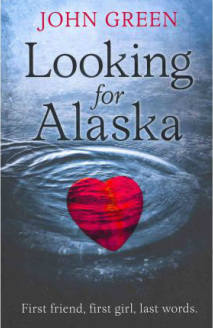“So this guy,” I said, standing in the doorway of the living room, “François Rabelais. He was this poet. And his last words were, ‘I go to seek a Great Perhaps.’ That’s why I’m going. So I don’t have to wait until I die to start seeking a Great Perhaps.”
An unpopular, friendless high school boy decides to attend a boarding school in Alabama in order to seek his Great Perhaps. Miles didn’t know what it would be, but he didn’t want to waste his life in not-knowing.
I resonate deeply with that feeling and I guess many of you do too. We want to go somewhere and find something exciting and do things and live.
At his new school, he makes new friends – his roommate Chip, aka the Colonel and his friends Alaska, Takumi and Lara. On the first night, sitting on the school swings and smoking cigarettes, the quote that will hover during the whole story comes up:
“He – that’s Simón Bolívar – was shaken by the overwhelming revelation that the headlong race between his misfortunes and his dreams was at that moment reaching the finish line. The rest was darkness. ‘Damn it,’ he sighed, ‘How will I ever get out of this labyrinth?’”
That is a fantastic quote and food for a lot of reflection and discussion. Later on the book, it is suggested that the labyrinth is suffering. How do you get out of this perpetual labyrinth of suffering? Most people don’t. They choose to stay in it and continue their lives pretending it doesn’t exist.
The rest of the story is filled with teenage love/lust, school pranks, sad stories and drama. I guess Miles found more than a Perhaps.
It is an easy read – I got hooked and finished it in a couple of days. What I can’t wrap my brain around is the way the characters talk. I don’t know any teenager who talks like that: so articulate, no slangs or corruptions and full of literary references.
I didn’t know John Green was a writer, but apparently he’s been doing it for a while and now I’m set out to read all his books (Currently reading: The fault in our stars). My boyfriend has already stocked our bookshelf. It was him who introduced me to John and Hank Green in the first place – their Crash Courses are awesome and addictive, as you can see below:
An unpopular, friendless high school boy decides to attend a boarding school in Alabama in order to seek his Great Perhaps. Miles didn’t know what it would be, but he didn’t want to waste his life in not-knowing.
I resonate deeply with that feeling and I guess many of you do too. We want to go somewhere and find something exciting and do things and live.
At his new school, he makes new friends – his roommate Chip, aka the Colonel and his friends Alaska, Takumi and Lara. On the first night, sitting on the school swings and smoking cigarettes, the quote that will hover during the whole story comes up:
“He – that’s Simón Bolívar – was shaken by the overwhelming revelation that the headlong race between his misfortunes and his dreams was at that moment reaching the finish line. The rest was darkness. ‘Damn it,’ he sighed, ‘How will I ever get out of this labyrinth?’”
That is a fantastic quote and food for a lot of reflection and discussion. Later on the book, it is suggested that the labyrinth is suffering. How do you get out of this perpetual labyrinth of suffering? Most people don’t. They choose to stay in it and continue their lives pretending it doesn’t exist.
The rest of the story is filled with teenage love/lust, school pranks, sad stories and drama. I guess Miles found more than a Perhaps.
It is an easy read – I got hooked and finished it in a couple of days. What I can’t wrap my brain around is the way the characters talk. I don’t know any teenager who talks like that: so articulate, no slangs or corruptions and full of literary references.
I didn’t know John Green was a writer, but apparently he’s been doing it for a while and now I’m set out to read all his books (Currently reading: The fault in our stars). My boyfriend has already stocked our bookshelf. It was him who introduced me to John and Hank Green in the first place – their Crash Courses are awesome and addictive, as you can see below:



